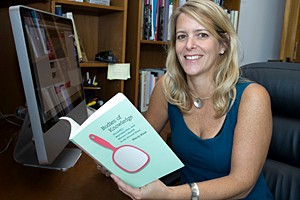
New Book Examines How Ordinary Women Revolutionized Healthcare in America
As 40th anniversary celebrations get underway surrounding the book, Our Bodies Ourselves, a new history examines the battles of ordinary women in demanding equality, choice and respect in medical treatment and education about their own bodies. University of Cincinnati researcher Wendy Kline, an associate professor of history, uncovers their struggles and their empowerment in her new book, Bodies of Knowledge Sexuality, Reproduction, and Womens Health in the Second Wave, published by The University of Chicago Press.
Described as one of the most compelling accounts of the history of womens health and feminist activism, Klines book begins by tracing the impact of the Boston Womens Health Book Collective that organized in 1970, leading to the publishing of Our Bodies Ourselves in 1973 a book that has never gone out of print and is now translated into numerous languages. It was a movement that was credited with driving social change around the world, as it generated the first open conversations about womens health and sexuality.

Book
Kline was one of the first researchers to gain access to the archives of the Boston Womens Health Book Collective, which is housed at the Schlesinger Library at Harvard University. Kline says the papers include thousands of letters from ordinary women perhaps the only accounts they had ever written or spoken of regarding the hurdles they encountered in gaining access to knowledge about their own reproductive systems a taboo topic in a more conservative era dominated by male doctors.
These were women writing from their kitchen tables, who left no other written record but these pages of how the treatment they endured had left them so angry and in some cases, this anguish led to the end of their marriages, Kline says. Some of the most revolutionary events were not related to the abortion debate, but instead surrounded general health issues and how poorly these women felt they were treated by their doctors.
It wasnt just a feminist issue, but it was the idea that your own knowledge about your own body was legitimate. It wasnt privileged doctor knowledge but rather the argument that everyone has the right to information about their body, and I argue that this really came out of the womens health movement, says Kline.
The book explores four themes regarding treatment and education that emerged from the movement
- The controversy surrounding medical school instruction of pelvic exams in the 1970s
- The abortion debate and womens health
- The racial controversy surrounding the promotions of Depo-Provera as a contraceptive and the impact of the Public Board of Inquiry investigation into its safety
- Midwifery, Lamaze and choices in childbirth
Kline says the book not only examines the progress that was made as a result of the womens health movement, but also touches on the following generations of women that emerged as the daughters of feminism, and the issues they face today.

Kline
The book is available in hardcover and paperback and can be ordered online.
It is also available at a discount on Amazon.com.
Klines book will be featured in a book-signing and discussion at 5:30 p.m., Thursday, Oct. 7, in the Taft House Lecture Room, located in UCs Charles Phelps Taft Research Center at 2625 Clifton Ave. in Stratford Heights. The book-signing part is hosted by the Taft Research Center and the Medical Humanities Research Group.
Related Stories
Inside the wild ways many creatures make milk
May 14, 2024
UC biologist Joshua Benoit tells Smithsonian that it's not just cows and other mammals that make milk for their newborns. Even some insects like beetle-mimic cockroaches and tsetse flies produce a protein rich "milk" for their babies.
UC grad turns humanities degree into entrepreneurial success
May 14, 2024
Growing up on Ludlow Ave. in the Cincinnati neighborhood of Clifton, Harrison Fowler had planned to enroll in the Reserve Officers’ Training Corps (ROTC) at the University of Cincinnati. UC was close to home, and ROTC seemed like the right choice. But life had other plans. At the last minute, Fowler withdrew from ROTC and enrolled to earn his bachelor’s in Spanish, which meant he needed a study-abroad experience to complete his degree. He was apprehensive, but completed his requirement in Madrid, in a move that would change the direction of his life. Says Fowler of his foreign-language major, and his experience abroad: “Speaking another language opens up a whole other world and relationships for you.”
Preventable loss: A billion birds die each year from window...
May 13, 2024
A biologist with the University of Cincinnati is raising public awareness about ways to keep birds from striking windows, a national problem that is leading to alarming declines in populations.
